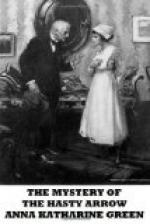“I have an explanation, but I cannot say that it is altogether satisfactory. She died but yesterday, and my opportunities have been small for any work since. What I have learned was from her sister-in-law, whom I saw this morning. Realizing that she will be obliged to give full testimony at the inevitable inquest, she is at last ready to acknowledge that she has been aware for a long time of a secret in Madame’s life. That while she knew nothing of its nature, she had always thought that it was in some manner connected with her prolonged residence abroad. Whether it would also explain the meaning of her return at this time and the seemingly inexplicable change made in her daughter’s name while en route, must be left to our judgment. Madame had told her nothing. She had simply made use of their home, coming and going, not once, but twice, without giving them the least excuse for her inexplicable conduct. A hundred questions could not elicit more. But to one who like myself has had the opportunity of observing this wretched woman at the moment of her supreme distress an insight is given into her character, which suggests the only plausible explanation of her action. Her sacrifice was one of devotion! She perished in an exaltation of feeling. Love drove her to this desperate act. Not the love of woman for a man, but the love which women of her profound nature sometimes feel for one of their own sex. Mrs. Taylor was her friend—wait, I hope to prove it—and to save her from experiencing the extreme misery of seeing the man who was the joy as well as bane of her life suffer from the consequences of his own misdeeds, Antoinette Duclos felt willing to die and did. You smile, gentlemen. You think the old man is approaching senility. Perhaps I am, but if the contention is raised that no connection has been shown to exist between Mrs. Taylor and this foreign Madame, save such as was made by the death of Madame’s child, I must retort by asking who warned Madame Duclos of the fatal occurrence at the museum in time for her to flee before even our telephone messages reached her hotel? Gentlemen, there is but one person who could have done this—our chief witness, Ermentrude Taylor. She alone had not only the incentive, but the necessary opportunity. Coroner Price as well as myself made a great mistake when we allowed Mrs. Taylor to go home alone that day.”
“Very likely.” This from the Chief Inspector. “But if the information I have received on this point is correct, she seemed at that time to be so entirely dissociated with a deed whose origin had just been located in the opposite gallery, that you have no real cause to blame yourselves in this regard.”




